Abstract
More than 90 morphological and physiological characters of 227 strains of pseudomonads isolated from clinical specimens and 16 reference strains are described. The clinical isolates included P. aeruginosa (apyocyanogenic), P. fluorescens, P. putida, P. pseudomallei, P. cepacia, P. acidovorans, P. alcaligenes, P. pseudoalcaligenes, P. stutzeri, P. putrefaciens, P. maltophilia, and P. diminuta.
Full text
PDF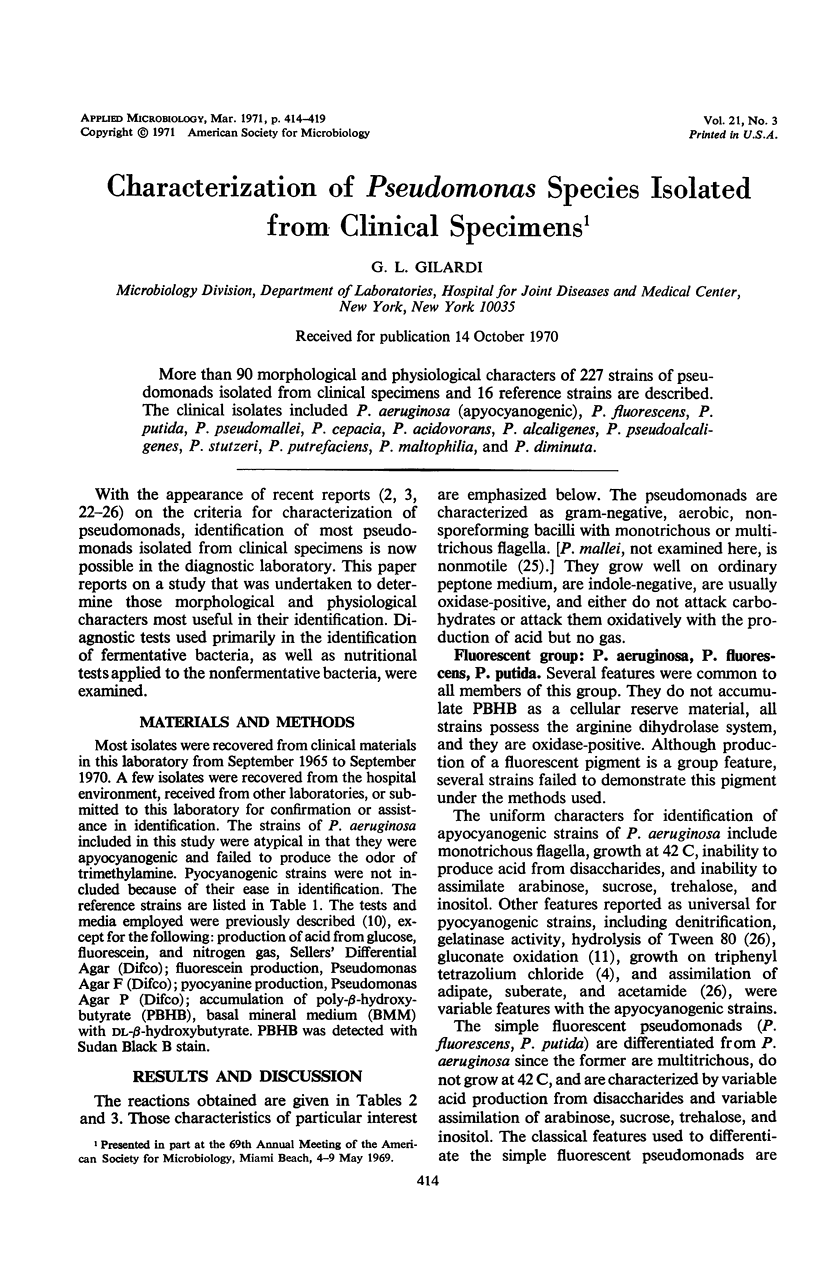
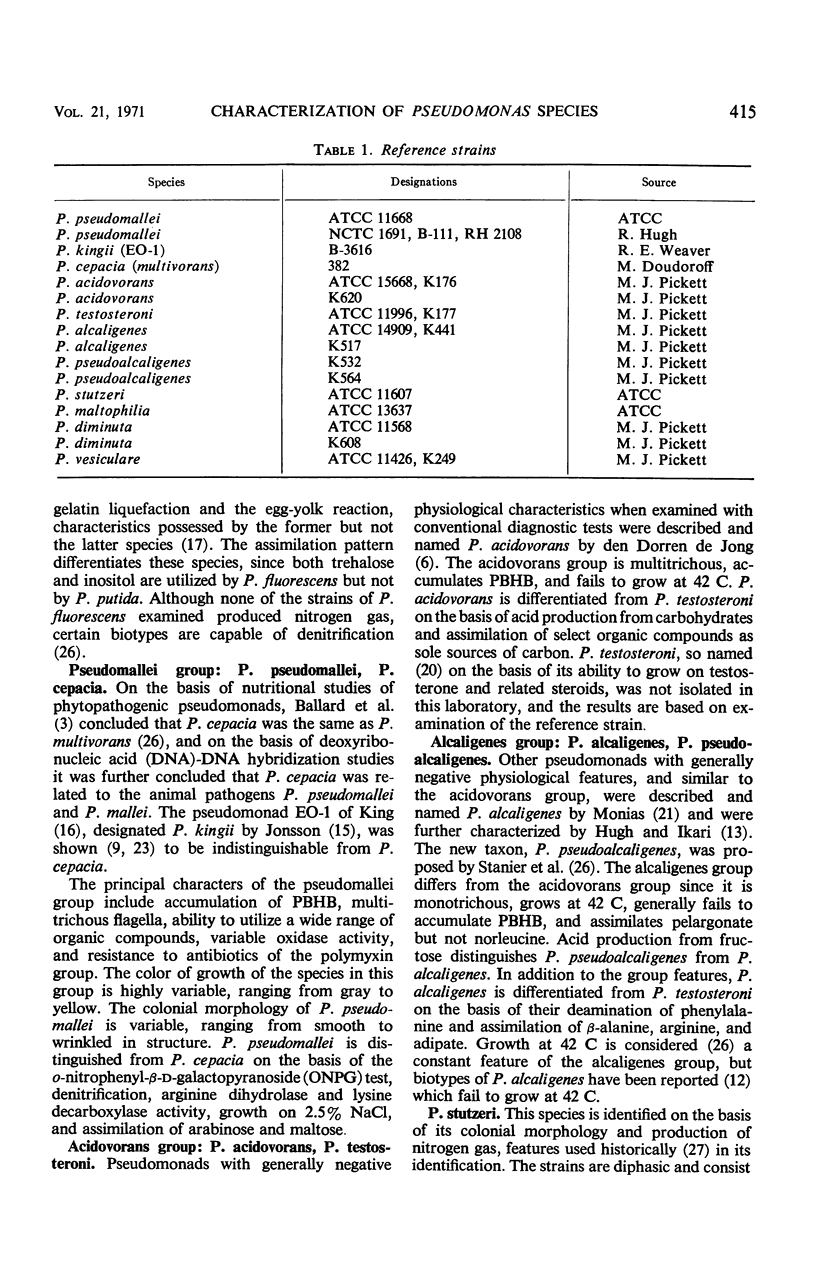
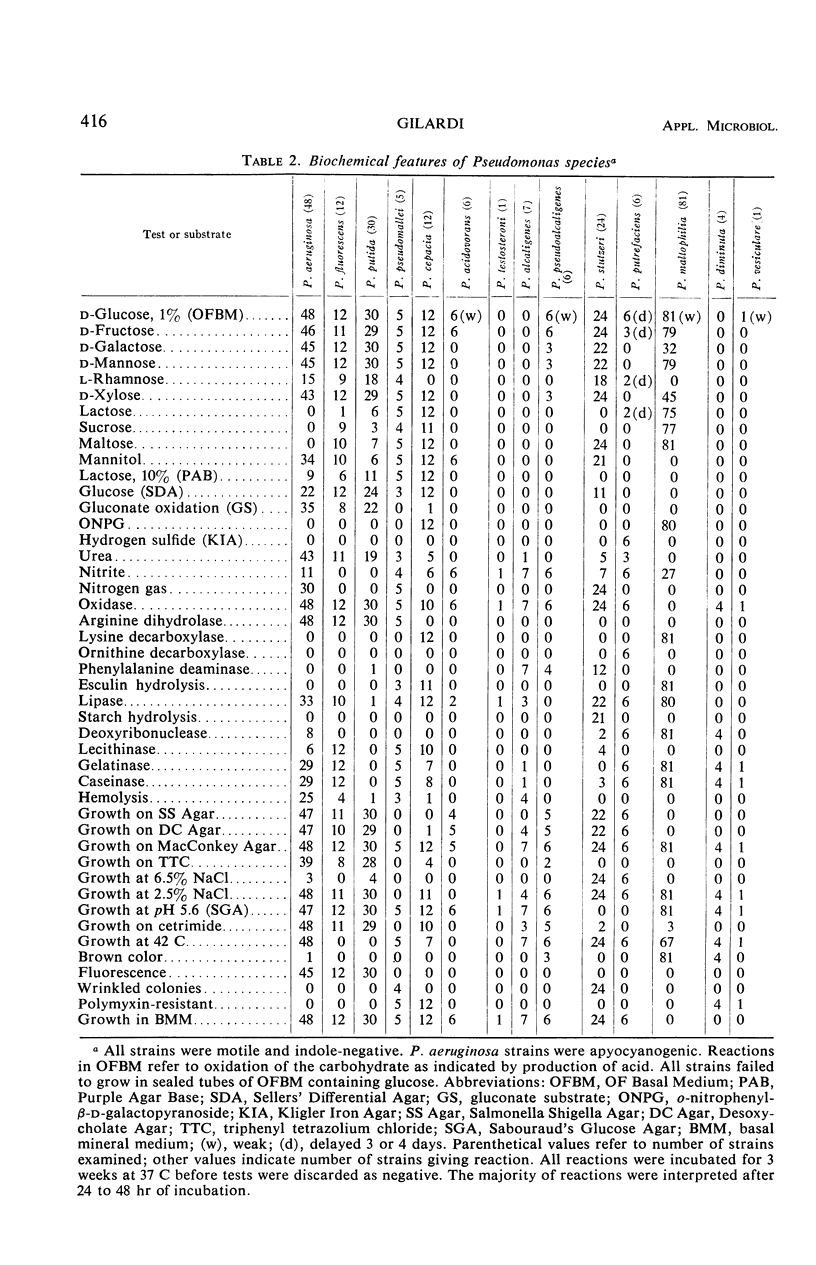
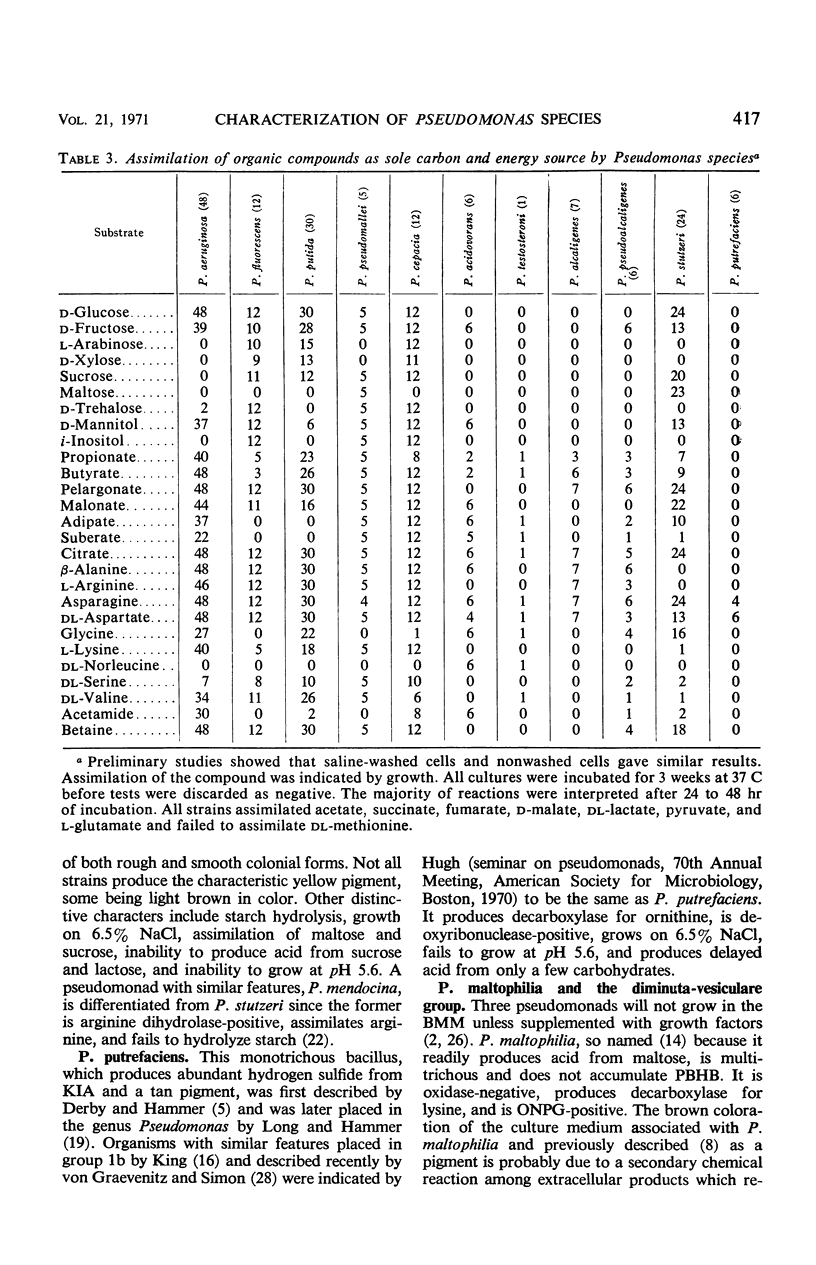
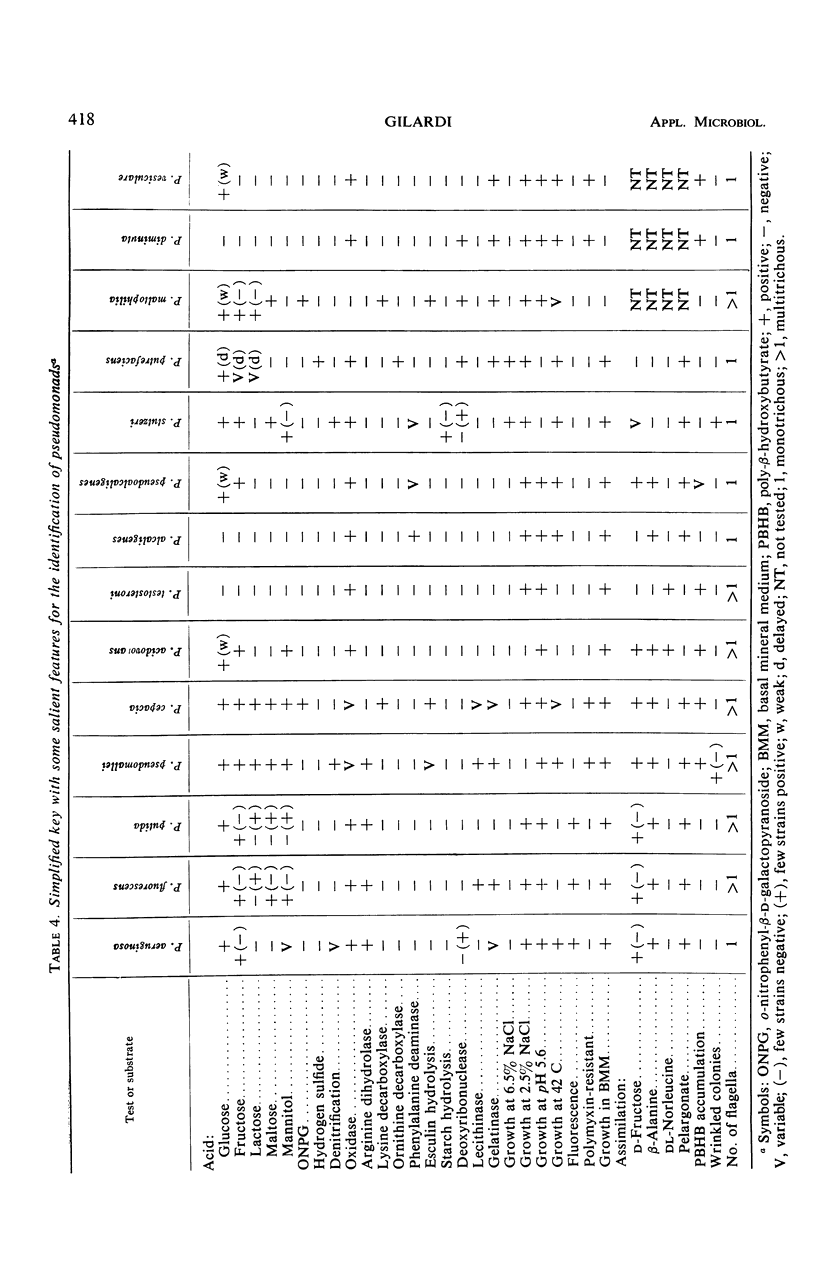
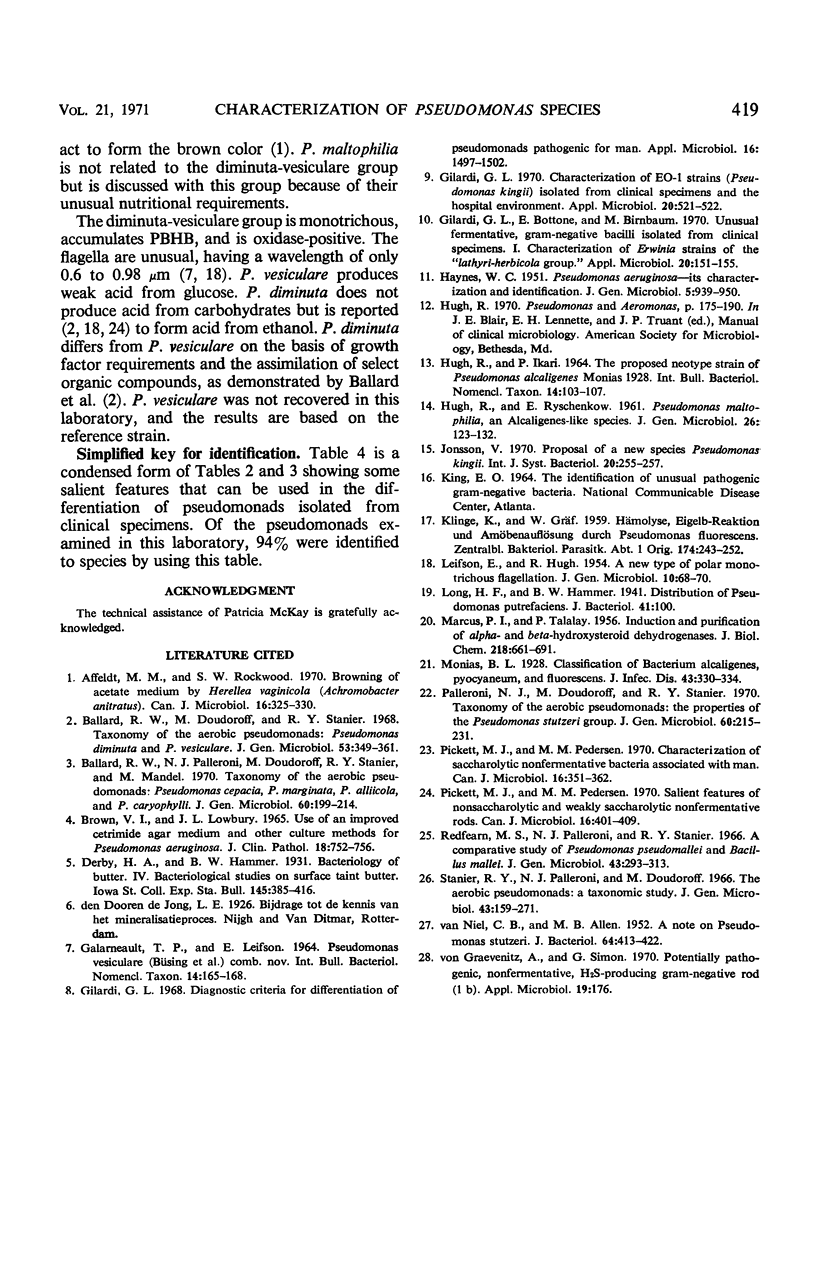
Selected References
These references are in PubMed. This may not be the complete list of references from this article.
- Affeldt M. M., Rockwood S. W. Browning of acetate medium by Herellea vaginicola (Achromobacter anitratus). Can J Microbiol. 1970 May;16(5):325–330. doi: 10.1139/m70-058. [DOI] [PubMed] [Google Scholar]
- Ballard R. W., Doudoroff M., Stanier R. Y., Mandel M. Taxonomy of the aerobic psuedomonads: Pseudomonas diminuta and P. vesiculare. J Gen Microbiol. 1968 Oct;53(3):349–361. doi: 10.1099/00221287-53-3-349. [DOI] [PubMed] [Google Scholar]
- Ballard R. W., Palleroni N. J., Doudoroff M., Stanier R. Y., Mandel M. Taxonomy of the aerobic pseudomonads: Pseudomonas cepacia, P. marginata, P. alliicola and P. caryophylli. J Gen Microbiol. 1970 Feb;60(2):199–214. doi: 10.1099/00221287-60-2-199. [DOI] [PubMed] [Google Scholar]
- Brown V. I., Lowbury E. J. Use of an improved cetrimide agar medium and other culture methods for Pseudomonas aeruginosa. J Clin Pathol. 1965 Nov;18(6):752–756. doi: 10.1136/jcp.18.6.752. [DOI] [PMC free article] [PubMed] [Google Scholar]
- Gilardi G. L., Bottone E., Birnbaum M. Unusual fermentative, gram-negative bacilli isolated from clinical specimens. I. Characterization of Erwinia strains of the "lathyri-herbicola group". Appl Microbiol. 1970 Jul;20(1):151–155. doi: 10.1128/am.20.1.151-155.1970. [DOI] [PMC free article] [PubMed] [Google Scholar]
- Gilardi G. L. Characterization of EO-1 strains (Pseudomonas kingii) isolated from clinical specimens and the hospital environment. Appl Microbiol. 1970 Sep;20(3):521–522. doi: 10.1128/am.20.3.521-522.1970. [DOI] [PMC free article] [PubMed] [Google Scholar]
- Gilardi G. L. Diagnostic criteria for differentiation of pseudomonads pathogenic for man. Appl Microbiol. 1968 Oct;16(10):1497–1502. doi: 10.1128/am.16.10.1497-1502.1968. [DOI] [PMC free article] [PubMed] [Google Scholar]
- HAYNES W. C. Pseudomonas aeruginosa--its characterization and identification. J Gen Microbiol. 1951 Nov;5(5 Suppl):939–950. doi: 10.1099/00221287-5-5-939. [DOI] [PubMed] [Google Scholar]
- HUGH R., RYSCHENKOW E. Pseudomonas maltophilia, an alcaligenes-like species. J Gen Microbiol. 1961 Sep;26:123–132. doi: 10.1099/00221287-26-1-123. [DOI] [PubMed] [Google Scholar]
- KLINGE K., GRAF W. Hämolyse, Eigelb-Reaktion und Amöbenauflösung durch Pseudomonas fluorescens; ein Beitrag zur Erkennung der protostatisch-protozide Wirkstoffe bildenden P. fluorescens-Stämme bei der Bodenfiltration. Zentralbl Bakteriol Orig. 1959 Feb;174(3-4):243–252. [PubMed] [Google Scholar]
- LEIFSON E., HUGH R. A new type of polar monotrichous flagellation. J Gen Microbiol. 1954 Feb;10(1):68–70. doi: 10.1099/00221287-10-1-68. [DOI] [PubMed] [Google Scholar]
- MARCUS P. I., TALALAY P. Induction and purification of alpha- and beta-hydroxysteroid dehydrogenases. J Biol Chem. 1956 Feb;218(2):661–674. [PubMed] [Google Scholar]
- Palleroni N. J., Doudoroff M., Stanier R. Y., Solánes R. E., Mandel M. Taxonomy of the aerobic pseudomonads: the properties of the Pseudomonas stutzeri group. J Gen Microbiol. 1970 Feb;60(2):215–231. doi: 10.1099/00221287-60-2-215. [DOI] [PubMed] [Google Scholar]
- Pickett M. J., Pedersen M. M. Characterization of saccharolytic nonfermentative bacteria associated with man. Can J Microbiol. 1970 May;16(5):351–362. doi: 10.1139/m70-062. [DOI] [PubMed] [Google Scholar]
- Pickett M. J., Pedersen M. M. Salient features of nonsaccharolytic and weakly saccharolytic nonfermentative rods. Can J Microbiol. 1970 Jun;16(6):401–409. doi: 10.1139/m70-069. [DOI] [PubMed] [Google Scholar]
- Redfearn M. S., Palleroni N. J., Stanier R. Y. A comparative study of Pseudomonas pseudomallei and Bacillus mallei. J Gen Microbiol. 1966 May;43(2):293–313. doi: 10.1099/00221287-43-2-293. [DOI] [PubMed] [Google Scholar]
- Stanier R. Y., Palleroni N. J., Doudoroff M. The aerobic pseudomonads: a taxonomic study. J Gen Microbiol. 1966 May;43(2):159–271. doi: 10.1099/00221287-43-2-159. [DOI] [PubMed] [Google Scholar]
- VAN NIEL C. B., ALLEN M. B. A note on Pseudomonas stutzeri. J Bacteriol. 1952 Sep;64(3):413–422. doi: 10.1128/jb.64.3.413-422.1952. [DOI] [PMC free article] [PubMed] [Google Scholar]
- von Graevenitz A., Simon G. Potentially pathogenic, nonfermentative, H2S-producing gram-negative rod (1 b). Appl Microbiol. 1970 Jan;19(1):176–176. doi: 10.1128/am.19.1.176-176.1970. [DOI] [PMC free article] [PubMed] [Google Scholar]


